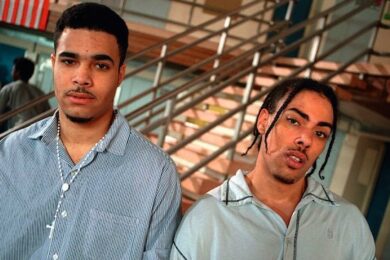“I might be a titch, but I can handle myself / I’m a one man menace to the National Health.” Paul McBride is filmed singing these lyrics with one arm dangling casually through the bars of his prison cell. Back in 2002, he was one of six inmates in HMP Feltham to have featured in Feltham Sings, a documentary detailing the lives of inmates in Europe’s largest Young Offender Institution. Directed by Brian Hill, Feltham Sings covers precisely the ground you might expect a prison documentary to cover. Six young offenders and two members of staff tell us candidly about their home-life, work-life, the crimes they have committed, the conditions behind bars, and their future plans upon release. The only thing separating it from any other prison documentary, is that they do so almost entirely in song.
The songs in question are a product of an unlikely collaboration. The eclectic mix of pop tunes, reggae, and R&B bangers were all produced by Errol Francis, otherwise known as DJ Dextrous. The lyrics to all but two of the songs were formulated from transcripts of the inmates’ interviews, and were put to rhyme and rhythm by Poet Laureate Simon Armitage. If this seems like a strange choice – it isn’t. While still merely moonlighting as a poet, Armitage spent the better half of a decade working as a probation officer in and around Greater Manchester, and completed his Master’s thesis on the effect of violent media on young offenders. The result of his work on Feltham Sings is a collection of lyrics that went on to win him an Ivor Novello award and cement his place in the canon of Prison Literature — a tradition as enduring and ancient as writing and prisons themselves.
This wasn’t Armitage and Hill’s first collaboration, nor was it their first musi-mentary. The two had already joined forces in 1998 to create Drinking for England, a deeply sinister depiction of booze culture in the UK in which depressed housewives and ruddy-faced pub-blokes came together to recite and sing a number of numbers ranging from the darkly comical to the darkly dark. In one scene, a pub-dwelling geezer straight out the pub-dwelling geezer catalogue cheerily sings along to the Armitage-penned lyrics “Thinkings a beautiful thing for a man / Thinks from a bottle and thinks from a can,” just moments after informing the cameras that he is there alone at the pub on his fortieth birthday with “no house, no car” and definitely, definitely no drinking problem. In what is arguably the documentary’s bleakest scene, a woman fighting off alcohol withdrawal shakily repeats the lines: “Don’t you know / Tell you why / Mother drinks / So do I” while her slurring gradually increases. The entire documentary …



